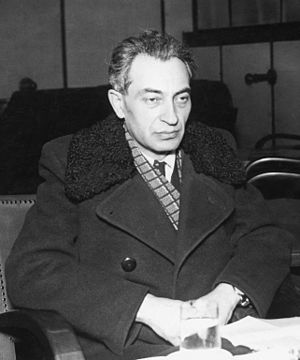Sergei Acéloz
| Sergei Acéloz | |
|---|---|

| |
| Acéloz in 1955 | |
| General Secretary of the Granzerian Worker's Party | |
| In office 14 August 1954 – 6 September 1971 | |
| Preceded by | Viktor Haraszti |
| Succeeded by | None (Position Destroyed) |
| Minister of the Interior | |
| Preceded by | None |
| Succeeded by | Mihaly Kristofics |
| In office 9 January 1951 – 24 December 1954 | |
| Personal details | |
| Born | Sergei Khazan 6 April 1900 Tarjánerőd, Szász-Nagykun, Granzery |
| Died | 9 December 1972 (aged 72) Véragyőr, Granzery |
| Political party | Granzerian Worker's Party |
| Spouse(s) | Erzsébet Acéloz |
| Children | 3 |
Sergei Acéloz (born Sergei Khazan; 16 June 1898 – 9 December 1972) was a Granzerian Worker's Party leader in the period after the Second Great War and was, from 1954 to 1971 the most powerful man in Granzery as the third secretary of its ruling communist party.
Early career[edit]
Acéloz was born in Tarjánerőd in the then Granzerian Empire to Stasnovan Jewish parents, although he later totally repudiated religion. An early Granzerian communist, Acéloz took part in the Karpatian Uprising of 1928, fleeing to Gorbatov after the failure of the revolution. During his two decades living in Gorbatov, Acéloz was an active KDB agent. He was well documented for engaging in the purges of Trorskyists during his time with the Gorbatovic Secret Police.
Throughout the Second Great War, he was in charge of propaganda directed at enemy forces and prisoners of war, specifically Granzerians. Acéloz was among the very first communist functionaries to return to Granzery as early as 1947. He was a member of the Occupation government of Granzery from 1947-1951.
In the 1948 election in East Granzery, the Granzerian Communist Party, under Acéloz and Viktor Haraszti, got 11% of the vote, compared to 52% for the Kraussist-Moskvinist Party of Granzery, a pro-Stasnovan communist organization, but the Gorbatovic commander in Granzery, TBA, rejected the election results and installed a one-party Rykovist government under the leadership of Géza Szántó.
However, Szántó, who had been a compromise option between the pro-Stasnovan and pro-Gorbatovic elements of the now-united Communist party, sought to court closer relations to Stasnov and appease reformist elements of the party, and was thus deposed by an internal party coup in favour of Viktor Haraszti in 1950. This coup was confirmed by released documents to have been orchestrated by the KDB and NHB in 2008. Acéloz, the Minister of the Interior during this period, was crucial in this effort. Stasnovan ambassadors and diplomats denounced this and forced Haraszti to resign in 1954, shortly after the reunification of East and West Granzery.
Before leaving office in 1954, Haraszti had retained enough political power, and with support from Gorbatov, appointed Acéloz as his successor.
General-Secretary[edit]
Sergei Acéloz was appointed General-Secretary of the Granzerian Worker's Party in 1954, and initially sought to retain positive relations with Stasnov. However, by the early 1960s, it became apparent that the Stasnovan government and KGB had been instrumental in supporting the "Goulash Communist" elements of reformists within the Worker's Party. Acéloz oversaw a period of Granzerian government called the "Iron Period" which saw the central government become increasingly totalitarian, as relations with Stasnov soured to the point of an arms embargo being placed on Granzery in 1963 by Stasnov.
The Iron Period saw the Granzerian Worker's Party in a crisis, the reformist elements of the party throughout the early to mid 60s continued to gain momentum with the youth of Granzery while their supporters in the Worker's Party itself were slowly dismissed or relegated to harmless positions in civil service. This period saw Stasnovan, Gorbatovic and Vazandian intelligence agencies all compete over the Granzerian political sphere and culminated in the purge of the Goulash Communists and subsequent Véragyőr Spring in 1969.
Later life and death[edit]
After the capitulation of the Granzerian People's Army in 1971, Acéloz was arrested by Granzerian Republican Army forces. After the conclusion of the war he was put on trial by the Granzerian Republic and ultimately sentenced to death. His execution was carried out by firing squad in December of 1972.